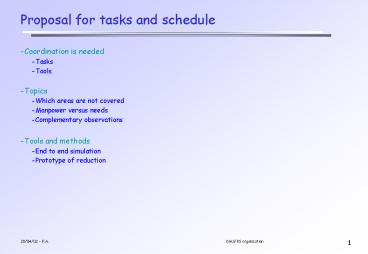Proposal for tasks and schedule - PowerPoint PPT Presentation
Title:
Proposal for tasks and schedule
Description:
Proposal for tasks and schedule Coordination is needed Tasks Tools Topics Which areas are not covered Manpower versus needs Complementary observations – PowerPoint PPT presentation
Number of Views:64
Avg rating:3.0/5.0
Title: Proposal for tasks and schedule
1
Proposal for tasks and schedule
- Coordination is needed
- Tasks
- Tools
- Topics
- Which areas are not covered
- Manpower versus needs
- Complementary observations
- Tools and methods
- End to end simulation
- Prototype of reduction
2
Questions (I)
- Selection function
- Should we go fainter in magnitude (larger mass
ratios) - In MBP/Spectro and in astro
- Which choice in dense areas
- How to organise the future DMS data processing
- Rejection from core processing
- Various categories of DMS
- Concurrential methods
3
Questions (II)
- Impact of binarity on spectro design
- Resolution and SB2 (simulation with correct
instrumental effects - in progress) - Someone from the RVS group could come into the
DMS group? - Impact of binarity on MBP design
- Interacting binaries
- Classification of unresolved binaries
- Need of interface with the photometric group?
4
Overall mission schedule
2004
2012
2016
2020
2008
2000
Acceptance
Techno. development
Build, Test
Launch
Observations
Analysis
Catalogue
5
Prio 1A the satellite design
- On-board detection
- Detection algorithm Arenou/Babusiaux -gt SEPT
02 - Detection limits for multiple objects
- Sample and patch study
- Optimise sampling windows and observing
Söderhjelm - strategy(at different magnitudes) Söderhjelm
- MBP/Spectro simulations
- Spatial resolution problems (large pixels!)
- Binarity effects for the filter selections
- Spectral resolution for efficient SB detection
- Random systematics for bright stars
- gain
(Short term - september 2002, PDHE study) Long
term - early 2005, design frozen (much
before, because of testing)
6
Prio 1B multiple stars in simulations and
reductions
- Galaxy model
- Binaries/multiples in simulations
- Prototype single-star reduction
- Rejection of multiples
- Database principles (multiple star/individual
component boundaries)
7
Prio 2A assessing the scientific capabilities
- Simplified reduction simulations
- Semi-realistic astrometric errors S.
Söderhjelm - BBP Photometric errors
- Resolution limits
- Curved proper motion detection limits
- SB detection limits
- Eclipsing binaries detection limits
- Galaxy modelling with multiple stars
- Expected numbers and accuracies for multiple star
observations with GAIA - Evolutionnary models
8
Prio 2B dedicated DMS reduction algorithms
- Reduction simulation with no a priori knowledge
- Resolved doubles
- Reduction simulation with period-finding
- Resolved binary orbits
- Astrometric binaries orbits D. Pourbaix
- SB orbits
- Extrasolar planet orbits
- Eclipsing binaries/transits N. Robichon
- Reduction simulations for multiple stars
- Resolved multiples
- Astrometric binaries in resolved binaries
- Eclipsing Binaries in resolved binaries
- (arbitarily long list of special cases...)
9
Prio 3 Science Case
- Uniqueness (or not) of the GAIA results
- Stellar masses
- Binary statistics
- Binary origin and evolution
10
Organisation
- Put names on task responsibilities
- Reference document (short term)
- Publication plan
- technical
- Scientific increase Gaia visibility
- Next meeting
- Parallel meeting in Monte-Rosa?
- 13-14 Sept
11
Actions
- Activate PS web page
- F.A.
- Give simulated data for orbit determination
- First agree on protocol
- F.A./C.B.
- Blind tests for orbits
- Dimitri
- Alessandro
- Hans-H
- What people can give, what they request for
simulations - All
- MarioDimitri to agree on protocol and to contact
Carine for simulations - ML circulate a page
12
Thanks
- To Annick Oger and Pascal Hammes for the
logistics - To Staffan for the scientific organisation
- To your contribution (to be sent by email)































